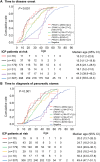SPINK1, PRSS1, CTRC, and CFTR Genotypes Influence Disease Onset and Clinical Outcomes in Chronic Pancreatitis
- PMID: 30420730
- PMCID: PMC6232107
- DOI: 10.1038/s41424-018-0069-5
SPINK1, PRSS1, CTRC, and CFTR Genotypes Influence Disease Onset and Clinical Outcomes in Chronic Pancreatitis
Abstract
Objectives: Rare pathogenic variants in the SPINK1, PRSS1, CTRC, and CFTR genes have been strongly associated with a risk of developing chronic pancreatitis (CP). However, their potential impact on the age of disease onset and clinical outcomes, as well as their potential interactions with environmental risk factors, remain unclear. These issues are addressed here in a large Chinese CP cohort.
Methods: We performed targeted next-generation sequencing of the four CP-associated genes in 1061 Han Chinese CP patients and 1196 controls. To evaluate gene-environment interactions, the patients were divided into three subgroups, idiopathic CP (ICP; n = 715), alcoholic CP (ACP; n = 206), and smoking-associated CP (SCP; n = 140). The potential impact of rare pathogenic variants on the age of onset of CP and clinical outcomes was evaluated using the Kaplan-Meier model.
Results: We identified rare pathogenic genotypes involving the SPINK1, PRSS1, CTRC, and/or CFTR genes in 535 (50.42%) CP patients but in only 71 (5.94%) controls (odds ratio = 16.12; P < 0.001). Mutation-positive patients had significantly earlier median ages at disease onset and at diagnosis of pancreatic stones, diabetes mellitus and steatorrhea than mutation-negative ICP patients. Pathogenic genotypes were present in 57.1, 39.8, and 32.1% of the ICP, ACP, and SCP patients, respectively, and influenced age at disease onset and clinical outcomes in all subgroups.
Conclusions: We provide evidence that rare pathogenic variants in the SPINK1, PRSS1, CTRC, and CFTR genes significantly influence the age of onset and clinical outcomes of CP. Extensive gene-environment interactions were also identified.
Conflict of interest statement
Figures



References
Publication types
MeSH terms
Substances
LinkOut - more resources
Full Text Sources
Miscellaneous

